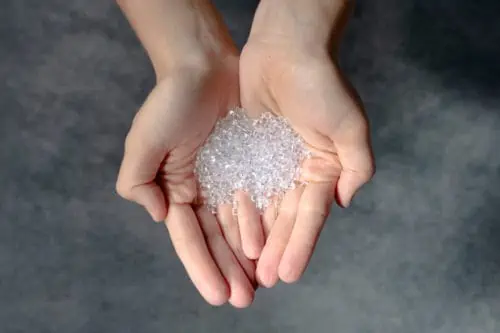Plastic injection molding is a manufacturing technique that involves injecting melted plastic resin into a mold to create molded products. It is a highly cost-effective and versatile technique that diverse industries rely on to manufacture precise, durable products. Polycarbonate is an example of a material used to produce these products. This page will discuss the process of polycarbonate injection molding, including its benefits, applications, and properties.
What Is Polycarbonate Injection Molding?
Polycarbonate is a transparent thermoplastic often used to produce parts with enhanced impact resistance and translucence. Its molecular structure allows it to maintain high viscosity, thermal resistance, and stiffness during processing.
Polycarbonate molding can accommodate components with complex geometries and tight tolerances with excellent repeatability. The technique implements rapid heating and cooling processes to manufacture products with superior strength and rigidity.
Polycarbonate Injection Molding Benefits and Applications
Molding polycarbonate gives manufacturers several advantages over other methods of plastic manufacturing, including:
- Reduced moisture absorption
- Excellent toughness
- High-temperature resistance
- Electrical insulation
- High strength at high temperatures
- Low coefficient of thermal expansion
- Creep resistance
- Does not deform under loads
- Naturally transparent, with light transmissivity comparable to glass
- High tensile strength
- Tight tolerances
- Reduced operating costs
- Reduced surface defects
- Quick production cycle times
Injection-molded polycarbonates make excellent products for a wide range of applications. The surface quality of these materials provides advanced functionality and high-end aesthetic value. Typical applications include:
- Equipment housings
- Aircraft parts
- Lab instrument covers
- Automotive parts
- Construction materials
- Electrical connectors and insulators
- Lighting fixtures
- Medical tubing and devices
- Brackets
- Eyeglass lenses
- Enclosures
Polycarbonate Injection Molding Properties
Polycarbonate is characterized by high flexural strength with a modulus of 340,000 psi and tensile strength of 9,000 psi. Considered slow-burning, PC maintains its rigidity up to 284 °F, and at 264-psi loading, it has a heat deflection temperature of 270 °F. You can also increase temperature and strength resistance by using fillers and reinforcements, with flame-resistant options available.
Customizing the properties of polycarbonate requires close attention to the chemical environment of the application. PC can be alloyed with acrylic, ABS, polyurethane, polyetherimide, PBT, and PET polyesters.
Polycarbonate Injection Molding From Lerner Molded Plastics
At Lerner Molded Plastics, our capabilities in creating custom and offshore injection mold designs enable us to tackle small, intricate, multi-cavity, and large component projects. We provide polycarbonate injection molding services to diverse clients throughout the United States. Our state-of-the-art, ISO-certified facility allows us to produce quality injection molded components from the initial design phase through full production and distribution.
With over 35 years of plastic manufacturing experience, we offer injection molding services for polycarbonate, ABS, polypropylene, acetal, acrylic, nylon, and more. In addition to injection molding, we specialize in custom blow molding, thermoforming, plastic extrusion, rotational molding, supply chain management, and a variety of value-added services.
To learn more about injection molding, check out our blog. Browse our service page to see our capabilities, and request a quote when you’re ready to start your order.


